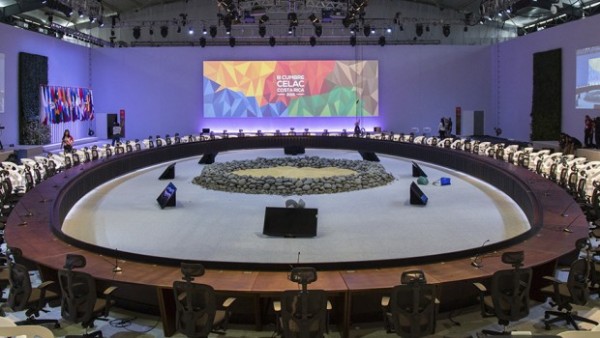Latin American and Caribbean states have once again shown a united front and a clear vision for the future of nuclear disarmament.
At the third annual summit of the Community of Latin American and Caribbean States (CELAC), heads of state of all 33 countries, issued a declaration fully supporting the outcomes of the Third International Conference on the Humanitarian Impact of Nuclear Weapons in Vienna last December and formally endorsing the Austrian Pledge. The Austrian Pledge, delivered by the deputy foreign minister of Austria at the end of the Vienna Conference, recognised the existence of a “legal gap” in the international framework regulating nuclear weapons and called on all states to join in efforts to fill this legal gap by pursuing measures which would stigmatise, prohibit and lead to the elimination of nuclear weapons.
CELAC is the first regional group of states to recognise that a treaty banning nuclear weapons is the best option to fill this gap:
“As has been demonstrated by the testimonies of survivors and evidence and scientific data, nuclear weapons constitute a serious threat to security, development of peoples and civilization in general. Being consistent with our declarations, in this purpose we reiterate our strong support to call made in Vienna and Nayarit to initiate a diplomatic negotiation process of an internationally legally binding instrument for the prohibition nuclear weapons.”
Carlos Umaña of IPPNW Costa Rica, an ICAN partner organisation, notes that, “With the CELAC Declaration, Latin American and Caribbean states have recognised they intend to remain at the forefront of efforts which bring us closer to a world without nuclear weapons. The Treaty of Tlatelolco, which established a nuclear weapons free zone across the region, was the first multilateral treaty to prohibit nuclear weapons in a region — now Latin American and Caribbean states intend to work to promote a similar process that bans nuclear weapons internationally.”
For decades, discussions on nuclear weapons have been dominated by the few nuclear-armed states – states that continue to stockpile and maintain over 16,000 warheads. The humanitarian initiative on nuclear weapons has prompted a fundamental change in this conversation, with non-nuclear armed states leading the way in a discussion on the actual effects of the weapons.
According to Daniel Högsta of ICAN, “The Austrian Pledge is a rallying call for states to demand action to fill an unacceptable legal gap. The momentum generated by the humanitarian initiative is paving the way for the commencement of a process to ban nuclear weapons. CELAC states have added their voices to the call. We expect other regions to do the same.”






